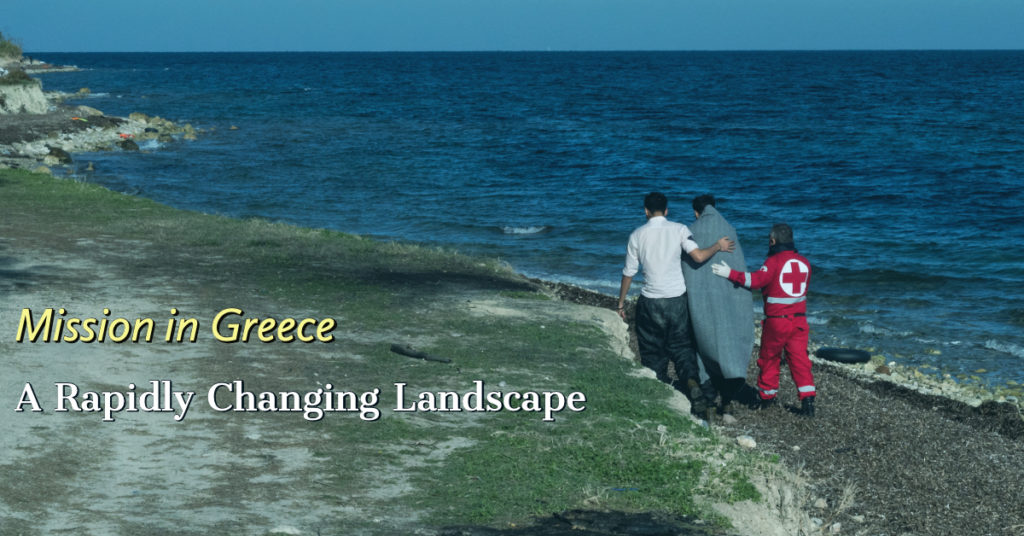A Rapidly Changing Landscape
Since 2014, the landscape of Europe has been changing at a rapid pace in regards to refugees and other people on the move. Asylum laws are constantly changing, countries are still overwhelmed with the amount of people moving from one place to another, integration is a struggle, and there are too many moving parts for most people to keep track of.
In April 2018, Greece ruled that new arrivals to the islands would not be confined to camps there during their asylum procedure. Previously, since the start of the deal with Turkey, those who arrived to the islands of Greece had to stay there for the whole duration of their asylum procedure. The fuller the camps became, the longer the wait for everyone – which caused tensions to rise. This legal change only applied to new arrivals, which is of course seen as unfair to all those who arrived earlier and feel that they are now trapped on the islands.
In addition to this change, a smuggling corridor was reopened at the Turkish/Greek land border with a 33% increase in refugee inflows to Greece in spring 2018 compared to the same season in 2017. At the Evros River that marks the boarder, the number has tripled because people think that the crossing is safer – despite the fact that seasonal floods and rushing waters have made things increasingly perilous. Tensions between Greece and Turkey are already high, and reports continue to come out alleging that even once refugees make it to the Greek side of the river, they are caught by the armed forces and made to cross back into Turkey.
According to professional sources (through contacts with various NGOs in Thessaloniki especially), these land crossings are contributing to increased tensions in Northern Greece, especially in Thessaloniki. In this city, the homeless population is already quite high and most aid organizations are at full capacity for the amount of beneficiaries they can take on.
In a town like Katerini, population of around 50,000 in the city proper and 85,000 in the municipality, tensions are beginning to grow. In the beginning the town was unsure but welcoming towards foreign families in need – and they still are welcoming overall – but their patience starts to grow thin. Some in the city have begun to grumble, “What’s going on? They have been here for too long.” Citizens were placated in the beginning by the sudden influx of new cash in their economy as over 550 refugees moved into the city center, each family with their own cash card to spend at local businesses and restaurants. Today, the organization I work for, Perichoresis—a partner of Global Ministries which is an agency of the Evangelical Church of Greece and a registered NGO—rents 115 houses/apartments in the city, giving these owners a stable source of income from the properties (some of which had been vacant for a while before we rented them). In addition, Perichoresis purchases all the furnishings for these apartments from local shops – putting even more money into the local economy.
But after almost two years, people here wonder how long it will all last. The UN will soon pull out of Greece (maybe in 2019, maybe in 2020) and when that happens, organizations and the families they help will have to begin standing on their own feet. Care for refugees will be turned over to local municipalities when the UN leaves, but many wonder if the municipalities are prepared for this handover of responsibilities.
I write this newsletter simply to show people just how much is in flux in the field I feel called to work in. When you live in the United States, or another country, and are not personally affected by human migration, it’s easy to be confused by the situation – “Why does it all have to be so complicated? Why can’t they just do X, Y, and Z?” The reality is increasingly complex and changing every day – legal structures that are updated, new pathways that people take to come to Europe, the tension felt in small city’s that host refugees, and the worries that come when professionals in the field look to the future. There are so many factors at play that it’s almost a job in and of itself just to keep updated on all this.
Working in this field means that the context in which you work is always shifting and changing. It’s hard to keep track of what’s going on, what information is still current and relevant, and how many people are in a certain place at any given time. It’s like trying to do yoga on a paddleboard in the middle of the ocean during a lightning storm and you’re surrounded by murky shadows in the water that may or may not be sharks. Things are intense.
Kearstin Bailey serves as a Global Mission Intern with the Evangelical Church in Greece, working with Perichoresis NGO in Katerini, Greece. Her appointment is made possible by your gifts to Disciples Mission Fund, Our Church’s Wider Mission, WOC, OGHS, and your special gifts.

